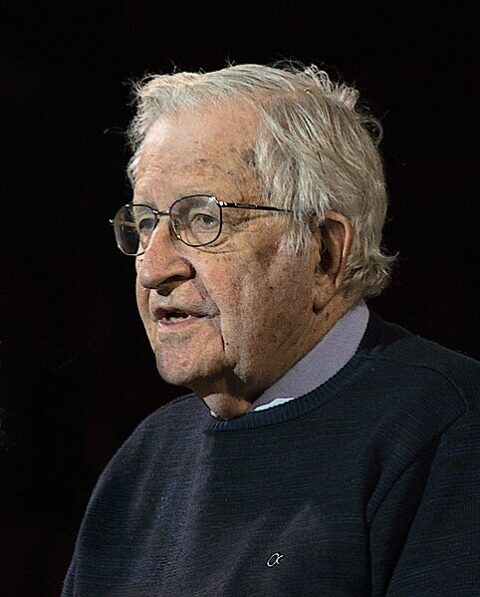The latest anonymous reviewer in Astral Codex Ten‘s “Your Book Review” series considers the work of Noam Chomsky, and notes just how his works dominate the field of linguistics:

Noam Chomsky speaks about humanity’s prospects for survival in Amherst, Massachusetts, United States on 13 April 2017.
Original photo by Σ, retouched by Wugapodes via Wikimedia Commons.
You may have heard of a field known as “linguistics”. Linguistics is supposedly the “scientific study of language“, but this is completely wrong. To borrow a phrase from elsewhere, linguists are those who believe Noam Chomsky is the rightful caliph. Linguistics is what linguists study.
I’m only half-joking, because Chomsky’s impact on the study of language is hard to overstate. Consider the number of times his books and papers have been cited, a crude measure of influence that we can use to get a sense of this. At the current time, his Google Scholar page says he’s been cited over 500,000 times. That’s a lot.
It isn’t atypical for a hard-working professor at a top-ranked institution to, after a career’s worth of work and many people helping them do research and write papers, have maybe 20,000 citations (= 0.04 Chomskys). Generational talents do better, but usually not by more than a factor of 5 or so. Consider a few more citation counts:
- Computer scientist Alan Turing (65,000 = 0.13 Chomskys)
- Neuro / cogsci / AI researcher Matthew Botvinick (83,000 = 0.17 Chomskys)
- Mathematician Terence Tao (96,000 = 0.19 Chomskys)
- Cognitive scientist Joshua Tenenbaum (107,000 = 0.21 Chomskys)
- Nobel-Prize-winning physicist Richard Feynman (120,000 = 0.24 Chomskys)
- Psychologist and linguist Steven Pinker (123,000 = 0.25 Chomskys)
- Two-time Nobel Prize winner Linus Pauling (128,000 = 0.26 Chomskys)
- Neuroscientist Karl Deisseroth (143,000 = 0.29 Chomskys)
- Biologist Charles Darwin (182,000 = 0.36 Chomskys)
- Theoretical physicist Ed Witten (250,000 = 0.50 Chomskys)
- AI researcher Yann LeCun (352,000 = 0.70 Chomskys)
- Historian and philosopher Hannah Arendt (359,000 = 0.72 Chomskys)
- Karl Marx (458,000 = 0.92 Chomskys)
Yes, fields vary in ways that make these comparisons not necessarily fair: fields have different numbers of people, citation practices vary, and so on. There is also probably a considerable recency bias; for example, most biologists don’t cite Darwin every time they write a paper whose content relates to evolution. But 500,000 is still a mind-bogglingly huge number.
Not many academics do better than Chomsky citation-wise. But there are a few, and you can probably guess why:
- Human-Genome-Project-associated scientist Eric Lander (685,000 = 1.37 Chomskys)
- AI researcher Yoshua Bengio (780,000 = 1.56 Chomskys)
- AI researcher Geoff Hinton (800,000 = 1.60 Chomskys)
- Philosopher and historian Michel Foucault (1,361,000 = 2.72 Chomskys)
…well, okay, maybe I don’t entirely get Foucault’s number. Every humanities person must have an altar of him by their bedside or something.
Chomsky has been called “arguably the most important intellectual alive today” in a New York Times review of one of his books, and was voted the world’s top public intellectual in a 2005 poll. He’s the kind of guy that gets long and gushing introductions before his talks (this one is nearly twenty minutes long). All of this is just to say: he’s kind of a big deal.
[…]
Since around 1957, Chomsky has dominated linguistics. And this matters because he is kind of a contrarian with weird ideas.



